You know, it’s really taken long enough for Wizards of the Coast to put out a Dungeons & Dragons Fifth Edition book centered around something that makes up half of the game’s title. Dragons have long been a core feature of the game, iconic enemies to defeat and, as time has gone one, one of the most complex set of non-human characters in the various settings of D&D. Some settings, like Dragonlance and Council of Wyrms, are entirely focused on them. With all that in mind, dragons have been a rather muted presence in 5e, showing up in monster manuals and such but not getting the spotlight you’d expect. That changes with Fizban’s Treasury of Dragons, a massive love letter to all things draconic and an essential addition to a DM’s toolkit. Contained within its pages are a bevy of dragons and dragonkin, new magic, new horrors, and, most importantly, a new way to look at the big scaly beasties that might radically alter their presence for years to come.
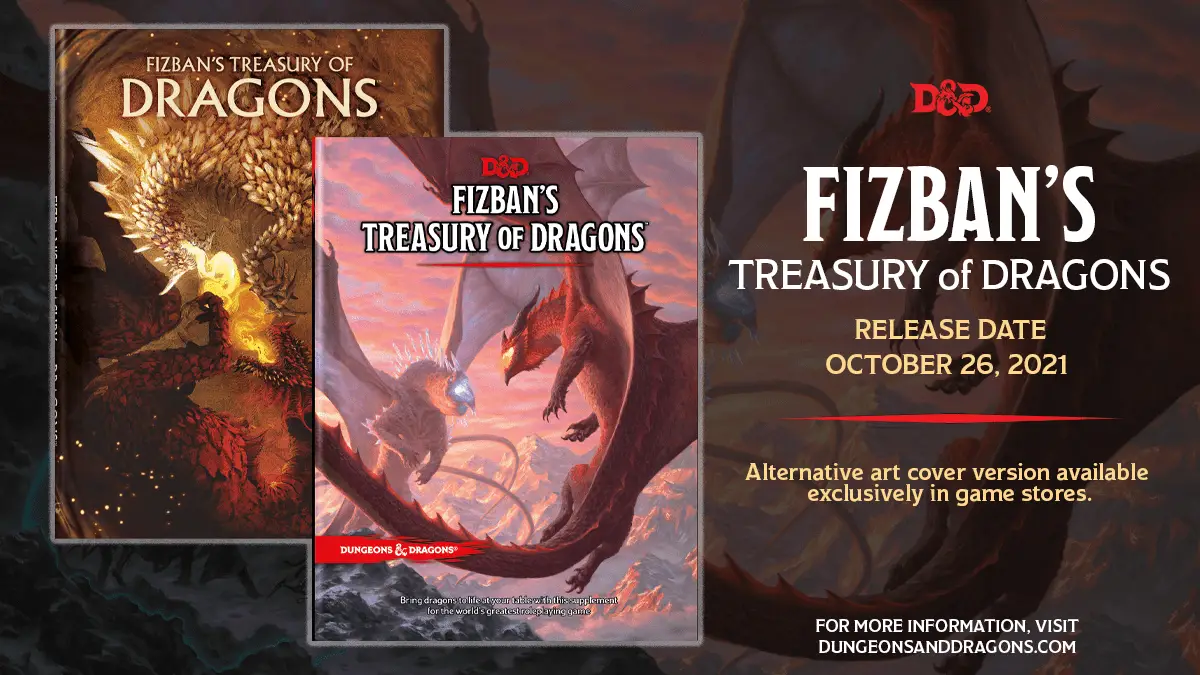
Dragons Are Classy
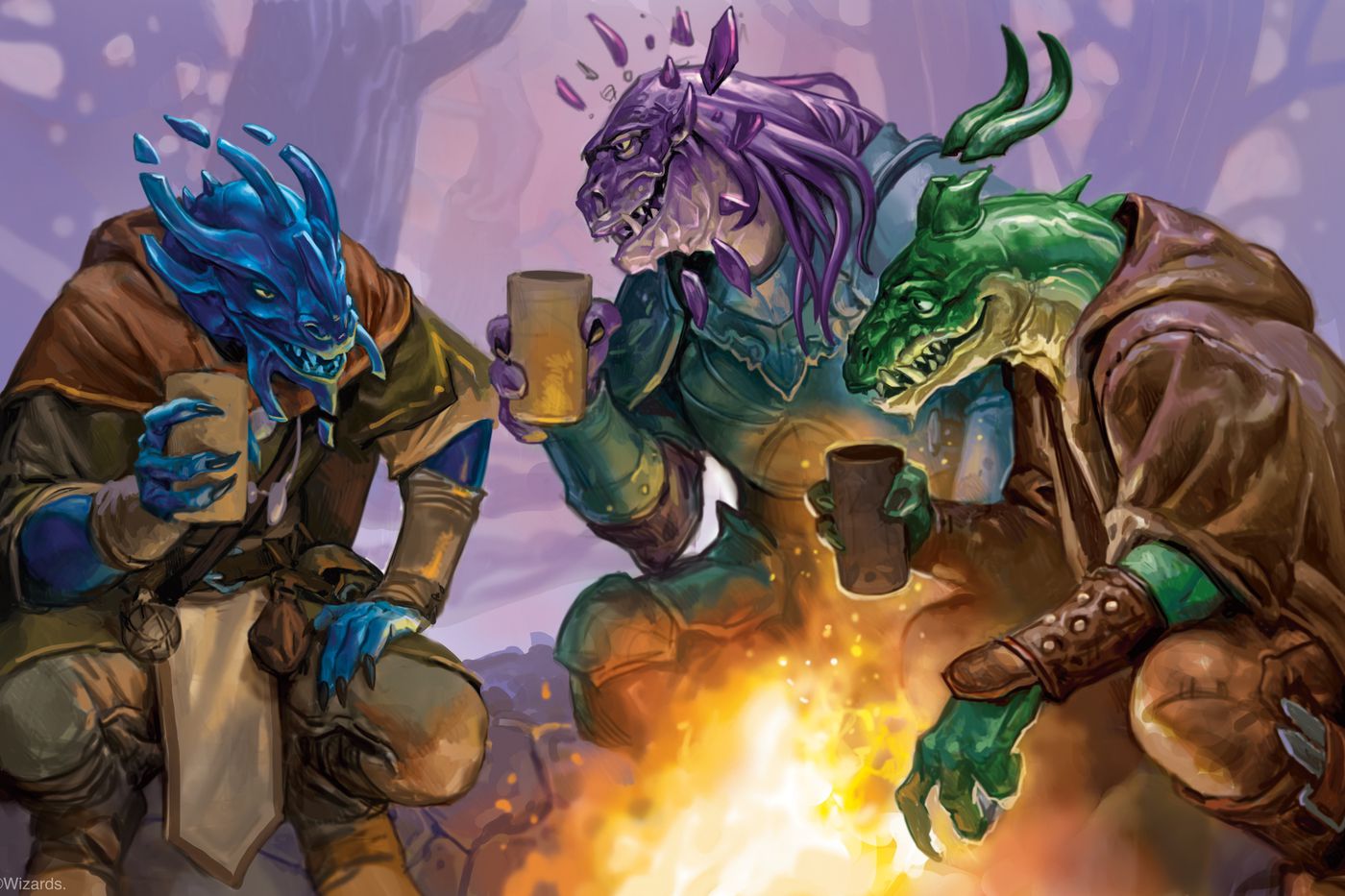
Sourcebooks like Fizban’s Treasury of Dragons don’t always have the meatiest of class options, since they’re mostly aimed at DM’s wanting to beef out their storytelling toolkit. Nevertheless, there’s a few good choices here that players will like, especially the addition of Gem Dragonborn, a weird, psionic twist on the race that adds in new breath weapons and a spectral form of flight at level five. They’ve also retooled chromatic and metallic dragonborn a little, separating them out more to represent the more unique approach to the different types the book uses. To whit, Chromatic dragons are about the same as always but gain more defensive abilities (their Dragonborn can shield themselves from a specific damage), while Metallic Dragons are a little more proactive, their Dragonborn getting two new breath weapon effects that can incapacitate or physically move someone around.
The Monk and the Ranger get new subclasses here as well. Monks who take up the Way of the Ascendent Dragon follow a fairly standard progression, getting more dragon powers as they level up (breath weapons, damage resistances, etc.). Rangers get the far more interesting Drakewarden subclass, which revolves around the summoning and use of a drake companion, who is a surprisingly strong companion that also eventually doubles as a mount. Long term bonds with the drake eventually give the Ranger a breath weapon and damage resistances. You see those a LOT in this book, along with wings. There’s only so many things you can take from dragons without getting too weird.
The Affairs of Dragons
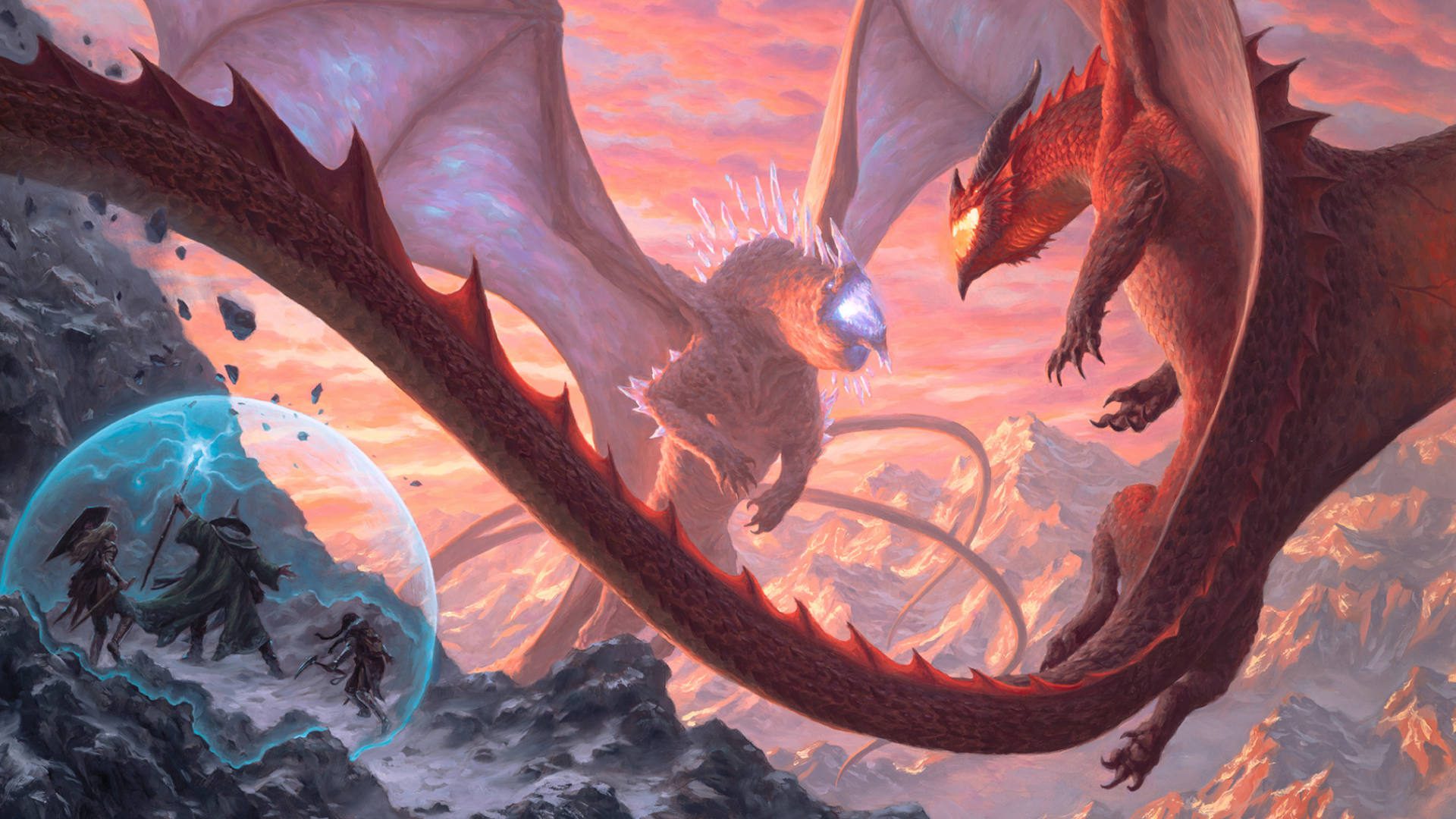
The main meat of the book is the in-depth exploration of dragonlore and the ripple effects that this lore has on the worlds in which dragons live. Dragons have loomed large over western fantasy for decades, thanks in large part to foundational texts like Beowulf and The Ring Cycle, as well as the pop culture penetration of dragon-centric fiction like The Hobbit and A Song of Ice & Fire. The problem that dragons have faced in Dungeons & Dragons is the same reason why gods don’t usually get stat blocks: if you can stick a sword in it then it loses some of its power.
Dragons are a classic end boss for a dungeon, up there with liches and beholders. Unlike those, a dragon can be adapted to any setting, any scenario needed. So they rapidly degenerate into more common dangers, just another obstacle. Their long-vaunted power gone and replaced by an easily memorized stat-block. And that’s not to say that Fizban’s Treasury of Dragons does away with statblocks or makes them unable to be fought. But what it does do is restore some of the majesty that I think they’ve been missing.
A key component of the lore of dragons as articulated in Fizban’s is the idea that dragons are uniquely tied to the planes and thus to reality. Their very existence shapes the nature of being. Dragons don’t just exist as one off monsters but instead echo through all dimensions. As they age they become more aware of this and some strive to achieve “dragonsight.” Truly ancient dragons can communicate with their other selves and even take counsel with them. A particular kind of draconic organization carve magical spells into their bodies that also appear on those dragons across the multiverse. It’s a fascinating concept and the amount of storytelling potential it holds for DM’s is immense.
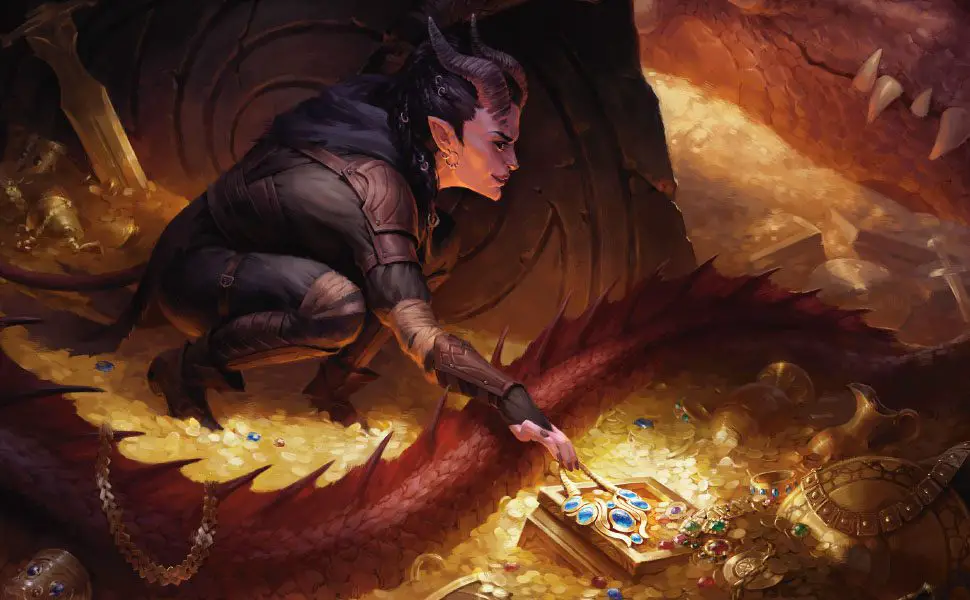
Dragons also have a much more “fisher king” effect on their surroundings now, and their lairs have all kinds of effects that a DM can use to give off a true sense of their power (whether it be poison-choked water, sweet smells, or strange music). Their hoards now can bear curses to deter thieves, and special hoard items gain power from being “steeped” in a dragon’s hoard for different amounts of time. It evokes the way that dragons act in Norse epics and classic folklore, and it’s really neat.
Draconomicon
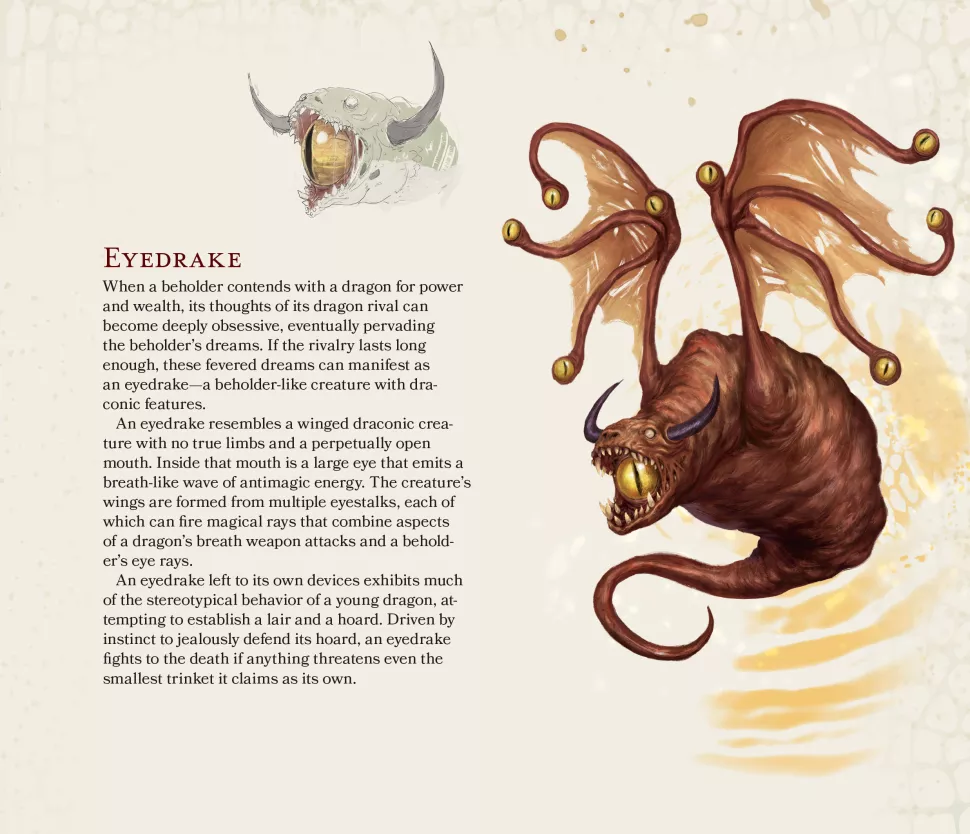
Of course you can’t have “true” dragons without a veritable army of dragonkin, lesser wyrms, and assorted scalie beasties serving them or being affected by their power. Yet again we see just how creative the team at Wizards can get with new, horrifying entries to the canon like the Elder Brain Dragon (it vomits brain-eating tadpoles!), the hoard mimic (think a classic mimic but five times its size and spitting out clouds of acid), and Dragonblood Oozes (sort of like evil, draconic blood jello). I’m particularly a fan of the Eyedrake and the Dragonflesh Grafter, the latter of which are dragon fanboys so depraved they’d give Shou Tucker pause.
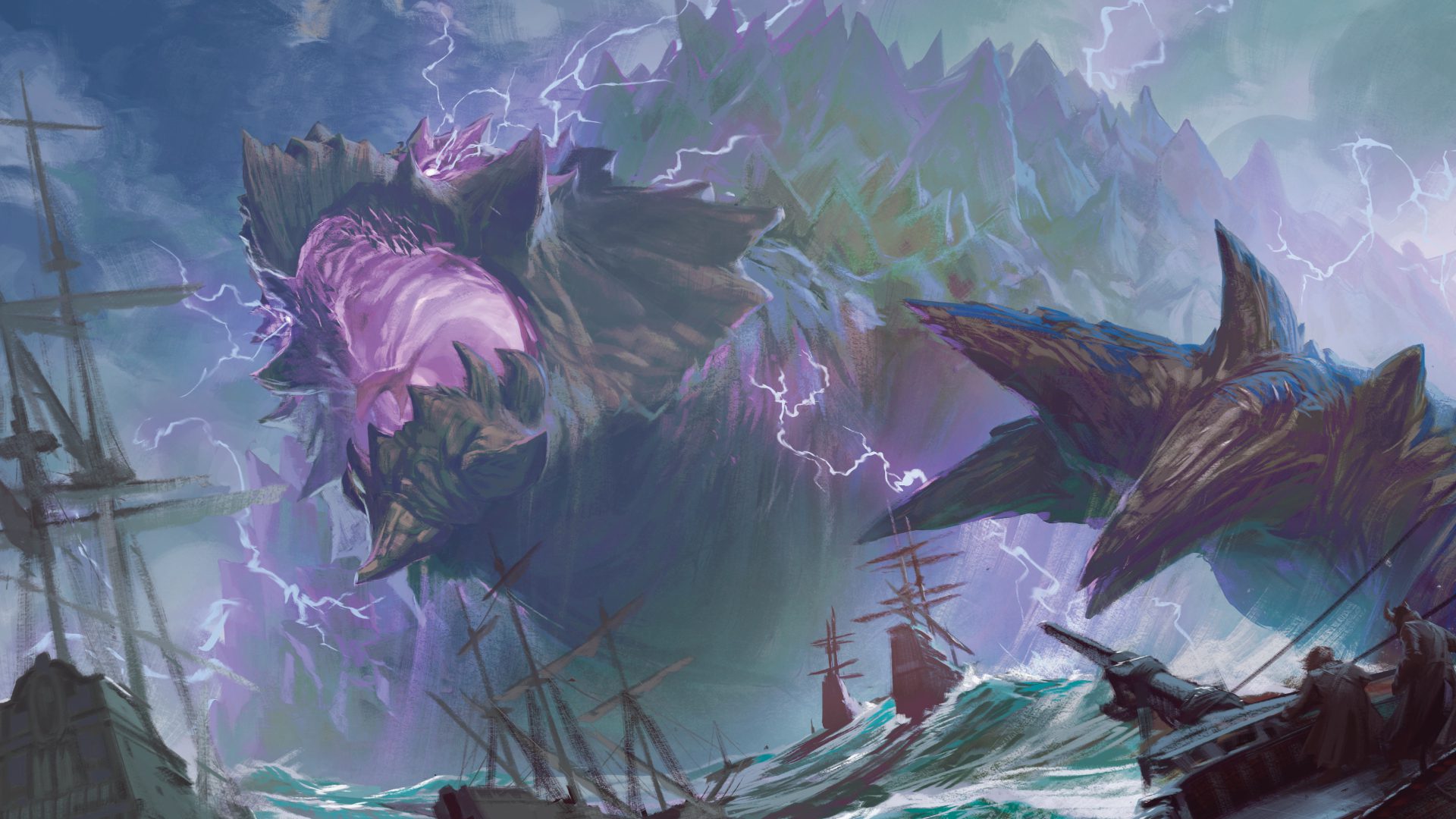
This book was a long time coming and it represents a new direction for the iconic dragons of the game, one that I think will repeat itself in other creatures as time goes on. The shift of D&D away from a combat simulator to a storytelling game has been slow going, but changing the relationship DM’s and players have with the world goes a long way towards helping it move in that direction. This book is obviously essential to anyone who wants to use dragons in their campaign or for playing dragon-influenced characters, but it’s a good read for anyone wanting to see how even the most hide-bound (scalebound?) can be re-imagined without losing what makes them special.
Stray Thoughts
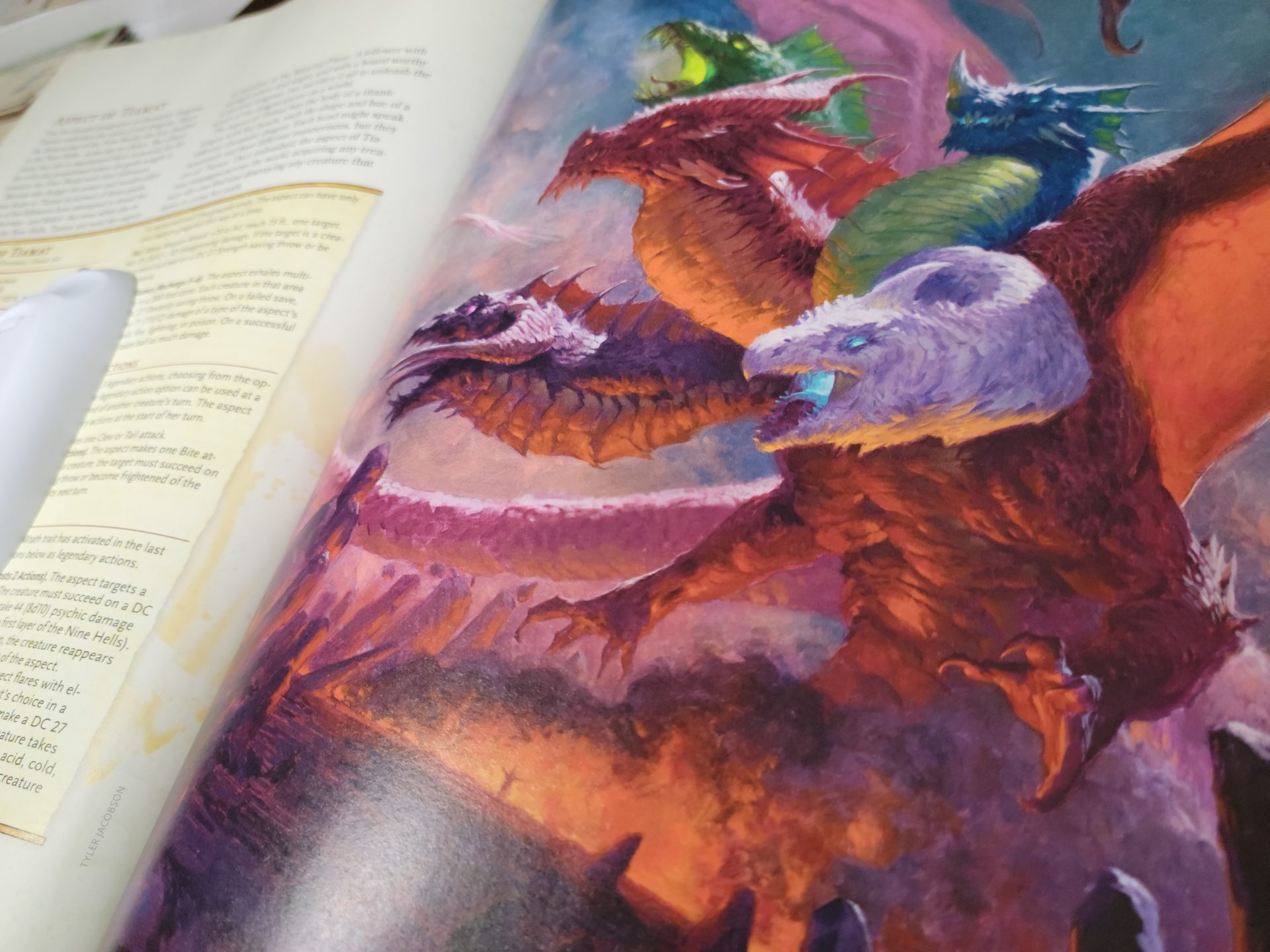
- Magic the Gathering’s Tarkir setting is listed alongside Council of Wyrms and Dragonlance as “dragon heavy” settings for campaigns. More Synergy!
- Fizban’s commentary is fun here and there, but the “snarky commentator” character didn’t really fit as well. Tasha had a sense of superiority to her and Van Richten was a throwback to the journal writing of classic horror. Fizban felt like he was almost ruining the mood sometime.
- Tiamat has a great presence in the book though since its narrated by Bahamut, she’s not quite as dreaded as you’d think.
- Gem dragons need more love from the fanbase.
- The three new feats included are a good way to add draconic flair to a character, letting you have a small taste of the dragon’s power without going to crazy.
- There’s a new magic item shaped like a little gold canary that can either turn into a giant canary or a gold dragon. Not sure why but I love it.
You can grab a copy of Fizban’s Treasury of Dragons at Amazon, Barnes & Noble, or your FLGS, where you can get the shiny alternative cover by Anato Finnstark! It’s also availiable digitally on D&D Beyond and other digital RPG sites.
Images via Wizards of the Coast
Have strong thoughts about this piece you need to share? Or maybe there’s something else on your mind you’re wanting to talk about with fellow Fandomentals? Head on over to our Community server to join in the conversation!

